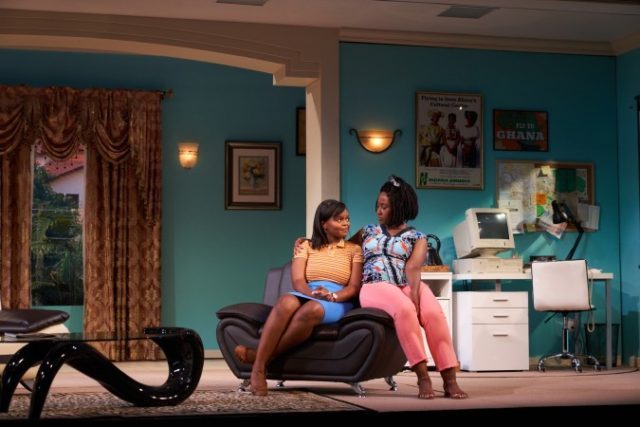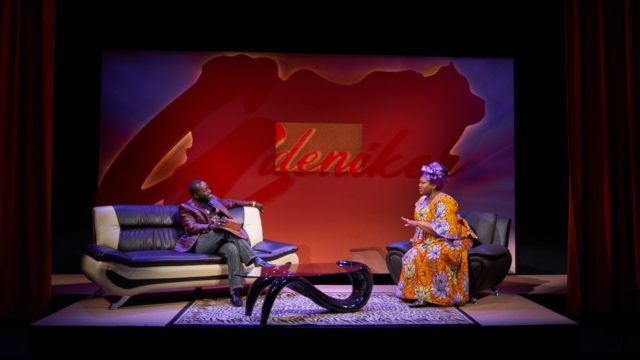
Sisters Ayamma (Sandra Okuboyejo) and Dede (Nana Mensah) are about to have a superstar travel into their lives in Nollywood Dreams (photo by Daniel J. Vasquez)
Newman Mills Theater, the Robert W. Wilson MCC Theater Space
511 West 52nd St. between Tenth & Eleventh Aves.
Tuesday – Sunday through November 28, $39-$88 (use code MCC)
mcctheater.org
“When your spirit is sad and you’ve given up / and you don’t know where to go / Don’t get down, turn around / Pick up that remote and tune into your favorite show!” So goes the theme song to the popular Adenikeh! talk show in Jocelyn Bioh’s Nollywood Dreams. The same can be said for the play itself, an appealingly sweet comedy continuing at MCC through November 28.
Nollywood Dreams is set in Lagos, Nigeria, in the early 1990s, during the rise of the Nigerian film industry, what would come to be known as Nollywood, named after Hollywood and Bollywood. Gbenga Ezie (Charlie Hudson III), who studied in New York City before becoming Nigeria’s most popular filmmaker, is holding an open casting call for his new movie, The Comfort Zone, looking for an actress to play the love interest of superstar celebrity and all-around hottie Wale Owusu (Ade Otukoya), a blend of Tom Cruise, Denzel Washington, George Clooney, and Will Smith.
Ayamma Okafor (Sandra Okuboyejo), a young woman who works in her parents’ travel agency, is determined to get the part despite her lack of experience. “This is my calling,” she tells her gossipy older sister, Dede (Nana Mensah), who works with her and believes that Wale is destined to be her future husband. When Ayamma arrives at Gbenga’s Nollywood Dreams Studios, she faces off against her main competition, established star Fayola Ogunleye (Emana Rachelle), the “Nigerian Halle Berry with Tina Turner legs,” who is willing to go to extreme lengths in order to get the role. But Ayamma is not going to just sit back and let that happen.

Director Gbenga Ezie (Charlie Hudson III) gossips with popular talk show host Adenikeh (Abena) in Nollywood Dreams (photo by Daniel J. Vasquez)
“Ah, I am so silly! How could I not see — you are perfect for the role of Comfort’s mother!” Ayamma snarkily says. After they read together, Ayamma tells Fayola, “I will never forget this day for the rest of my life,” to which Fayola responds, “That is nice. At least one of us will remember it.” When Ayamma later meets Wale, sparks fly, complicating Gbenga’s ultimate decision, as the movie-within-the-play is a ridiculously soapy tale that just might be based on Gbenga’s real life, echoing the relationship between him, Fayola, Wale, and Ayamma, which serves as fodder for Adenikeh (Abena) and her show.
Arnulfo Maldonado’s set switches back and forth between the travel agency, which features two old floppy-disk computers and posters of vacations to African nations, and Gbenga’s studio, which shares some of the same furniture while the walls are plastered with silly movie posters. The stage morphs into Adenikeh’s program several times, the central couch and chair moving forward toward the audience, with a backdrop where Alex Basco Koch’s projections play. (The mystery of the quick set changes is eventually revealed.) Abena is a blast as the talk show host, part Oprah Winfrey, part Wendy Williams, pronouncing her words very carefully — especially “Nigeria” — while wearing ornate African finery by award-winning costumer Dede Ayite.
Director Saheem Ali, who also helmed Bioh’s terrific School Girls; or, the African Mean Girls Play and overrated Shakespeare in the Park presentation Merry Wives, in addition to Anna Deavere Smith’s Fires in the Mirror at the Signature, Chris Urch’s The Rolling Stone at Lincoln Center, and Donja R. Love’s Fireflies at the Atlantic, takes just the right approach with the clever material, mixing slapstick comedy with sweet romantic flourishes. Bioh, who has appeared in such plays as Suzan-Lori Parks’s In the Blood, Branden Jacobs-Jenkins’s Everybody and An Octoroon, and Jaclyn Backhaus’s Men on Boats, explores not only celebrity culture and Nigerian film but class differences and ethnocentrism in Nollywood Dreams. After explaining to a phone caller that the Serengeti is not in Nigeria, Ayamma says to Dede, “These white people.” Her sister adds, “Africa is a country to them, you know that.”
In a script note, Bioh, an MCC playwright in residence who was born in New York City to Ghanaian parents and grew up watching low-budget Nollywood movies as a child in Washington Heights, writes, “Many of the themes of these [Nollywood] films dealt with love or family issues but were layered in subtext about the political strife/temperature of the country . . . telling the story of the sad duality that existed in Nigeria at the time: live like the rich or suffer like the poor — there is no middle. One could say the same about America, but I digress.”
In her daily greeting, Adenikeh says, “Thank you for letting me bring love into your home.” With Nollywood Dreams, Bioh, Ali, and a cool cast have brought love into the theater, as we finally escape our homes and return to live shows, especially irresistible ones such as Nollywood Dreams.